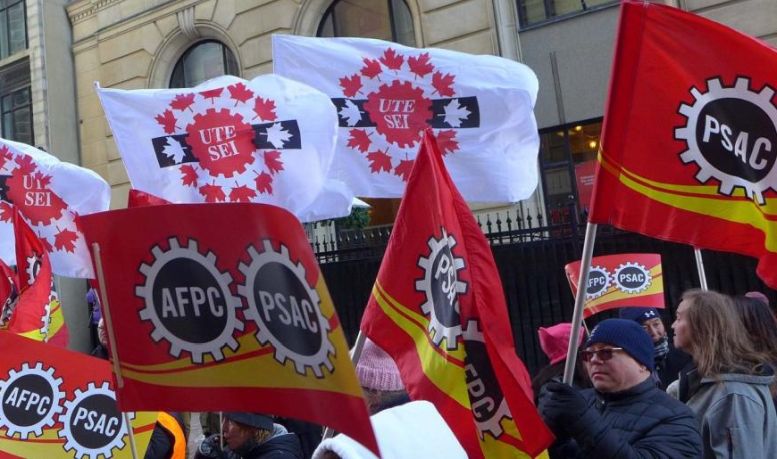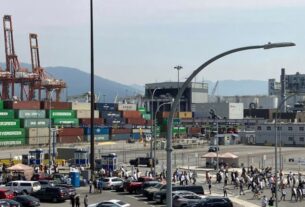On Wednesday, April 19, over 100,000 workers started their strike with pickets at least 250 workplaces.
On Friday, April 7, 35,000 workers at the Canada Revenue Agency (CRA) voted in favour of strike action ahead of mediation talks set to take place later this month. On Thursday, April 13, they were joined by another 120,000 of their colleagues in the Public Service Alliance of Canada (PSAC). They are known as the Treasury Board group. They administer programs, do communications work, clerical functions, data processing and much more. The PSAC sub-component, the Union of Taxation Employees (UTE), said in a statement that members voted “overwhelmingly” for strike action, as did the rest of the bargaining units, and would be in legal strike position as of April 14. The union is seeking wage increases, more flexibility on remote work and improved job security and work-life balance. The union has called for training to tackle discrimination at work, but the government is refusing to agree.
Union members have not had a collective bargaining agreement since October 31, 2021, and frustration has grown as the government drags out the negotiations.
“Tax season is here. Going on strike is never our first choice. But securing a strong strike mandate now gives us the leverage we need to reach a fair and decent contract,” stated Marc Brière, UTE president. Nothing is certain in this world except death and taxes said Benjamin Franklin 200 years ago. The death part of the quote remains true enough, but many Canadians could be getting something of a temporary break this year regarding taxes. A strike could potentially disrupt tax filing, the deadline for which is May 1, 2023.
Government employees, particularly those involved in tax collection, are not usually held in the highest regard. They’ll never match, say, nurses in public esteem, yet we should consider where our health and education systems would be if it was not for the workers who collect the money to fund them. At the beginning of the pandemic, people were out in the streets and on their balconies banging pots and pans to pay tribute to the health workers, and deservedly so. At the same time, there were some unsung heroes — thousands of PSAC members from Service Canada and the Canada Revenue Agency (CRA) volunteered to move from their regular duties and transition into the new positions that had been created to expedite Canada Emergency Response Benefits (CERB) payments. Thousands of PSAC members worked tirelessly, following the launch of CERB in April 2020, to process over 3.8 million applications in the first five days. Deposits for the benefit started arriving in laid-off workers’ bank accounts within as little as two days.
On the PSAC website, they describe a union member at a CRA call centre in Calgary who was helping thousands of people by phone from his home office. “He was a part of a virtual call-centre — supported by more than 2,000 union members from other parts of the CRA who were redeployed voluntarily. Hours of operation were extended into the evening up to 11 pm to ensure the public’s questions and concerns related to the CERB were addressed promptly.”
Justin Trudeau likes to portray himself as a friend of labour. During his first election campaign in 2015, he said, “I have a fundamentally different view than Stephen Harper of our public service. Where he sees an adversary, I see a partner. I believe that in order to have a public service that is valued by Canadians, and a source of pride for its members, it must be valued by its government. That begins with — and necessitates — respecting the labour rights of public servants, and trusting in their ability to provide effective, independent, and professional services for Canadians.”
Less than a month after Trudeau was elected Prime Minister, he spoke to a Canadian Labour Congress (CLC) meeting, becoming the first sitting prime minister to do so since 1958. He assured the labour leaders in attendance that he would follow through on the Liberal Party campaign pledge to repeal anti-union legislation, which he did, and told them that he realized that “labour is not a problem, but a solution.” However, only two years later, his government introduced back-to-work legislation that forced an end to the rotating strikes that Canada Post workers were then engaged in. Trudeau said his government had to act to protect small businesses and the livelihoods of Canadians. He was simply doing the dirty work for Canada Post.
These government workers expanded their commitments significantly during the pandemic despite, at the time, being without a contract for years. Service Canada and CRA employees had not had a wage increase for almost three and four years respectively. In addition, there is the threat of privatization hanging over their heads — in 2021, CRA outsourced roughly 130 jobs to a third-party contractor to answer general questions about the then emergency benefits despite the cost of contracting out being higher and less efficient than using public service employees.
According to Chris Aylward, PSAC national president, “The cost of living has hit highs we haven’t seen in 40 years, and people are struggling. Every day, we see that our dollar doesn’t go as far at the grocery store or at the gas pump. Today, PSAC members are sending a clear message that they won’t be taken for granted, they won’t fall further behind, and they’re ready to fight for better.”
PSAC workers deserve our full support. A victory for them would be a victory for all of us.




